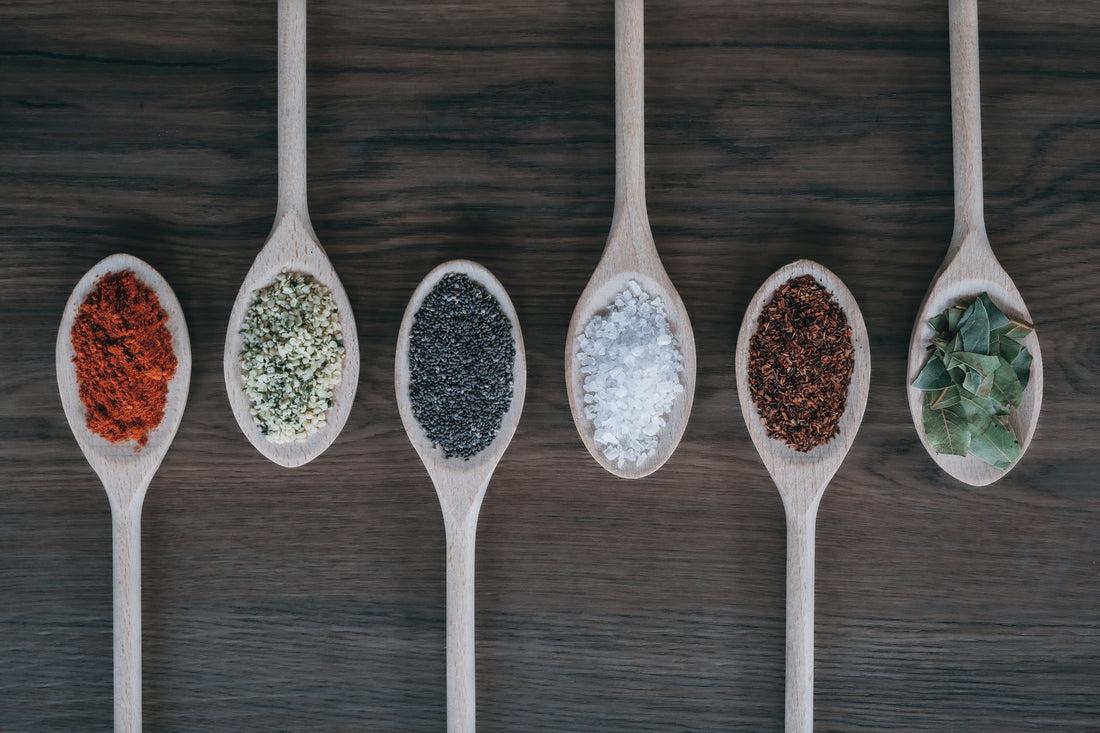
English food tends to have a reputation of being bland and lacking seasoning. Despite our traditional Yorkshire puddings, mince pies, fish and chips, and Victoria sponges, we tend to enjoy cuisine from around the world. In fact, Indian and Chinese takeaways are a UK favourite.
And we can certainly take inspiration from herb and spice pairings from different countries. Salt and pepper can certainly add their own flair to home cooking, but knowing how to combine other seasonings can take your dishes to the next level.add a new dimension to your cooking. So let’s look at which seasonings go well together.
Why use herbs and spices in your cooking?
Adding herbs and spices to your food can bring a load of flavour and enhance that of other ingredients. By adding your favourite herbs and spices to your soups, curries, stews, and more, not only are you getting variety in your dishes, but they also taste pretty darn good. But there’s more.
Ever wondered why certain foods, particularly curries, have vibrant colouring? This is because of the variety of spices often used in this type of cuisine. Turmeric, for example, can also make your meals appealing to the eye.
Herbs and spices are also packed with healthy compounds. Ginger, for instance, is most popularly regarded as a powerful anti-inflammatory ingredient and has tons of antioxidants. As well as tasting fresh, peppermint, may also bring health benefits. It’s thought to aid digestion, relieve tension headaches, and reduce anxiety. And, of course, it will also make your breath smell nice!
What spices go well together?
As with any new flavourings you’ll try, you will have to be willing to step out of your comfort zone. Some may sound yummy, whilst others may just appear weird. But, trust us, with the connoisseurs of seasoning.
Let’s run down some of the most popular spices used in our kitchens, and what other spices that complement them.
Cinnamon

Is it possible to think of this spice and not conure images of winter and Christmas? It’s one of the world’s most popular spices and for good reason.
If you’re wanting to add unexpected flavour kicks to your food, try pairing cinnamon with chilli powder. The blend of sweetness and spice balances well — you have the sweet, wooden flavour of cinnamon, with the bold punch of the chilli.
Paprika
Another unforgettable favourite often found in Spanish and Mexican foods. Paprika pairs surprisingly well with a number of other spices.
Paprika and garlic powder is a favourite combination of ours. The mixture can enhance almost any savoury dish.
Paprika and cumin is another excellent blend. Cumin’s depth makes it a great base flavouring, while paprika helps make it “pop”.
Ginger
As we have already covered, ginger has many potential benefits which can encourage us to consume it on a daily basis.
Ginger itself is a little sweet but has a surprising heat, making it a great addition to many sweet and savoury plates. Fortunately, there’s virtually no limit to the spices ginger goes well with.
Particularly good pairings include allspice, turmeric, cardamom, cumin and nutmeg. No need to use it gingerly...
What herbs go well together?
Now we’ve got the basic spices covered, let’s get onto the delicious herb pairings that will bring a new dynamic to your next meal.
Rosemary
Used in a multitude of ways, including in aromatherapy and medicine, rosemary has a striking and recognisable aroma. It’s a great seasoning for meat, poultry and vegetable dishes and can be even more delicious alongside a variety of other herbs.
Rosemary and thyme is a classic pairing. Both belong to the mint family, giving them a similar,
slightly peppery undertone. Or perhaps they work so well together because they both have a strong impact — they have a way of being assertive without overpowering one another. A match made in Heaven, and a go-to for all herb lovers.
Basil
Basil, one of the most popular fresh herbs, is found in a variety of meals. Whether as part of the cooking or placed on top as a garnish, basil’s unique taste can complement just about anything.
In cooked dishes, basil pairs the best with garlic, oregano, thyme, and bay leaves. When used fresh, basil pairs the best with mint, parsley, chives, dill. We’re prepared to say it’s the most adaptable herb!
Mint
Though it’s technically a shrub, mint is a very distinctive herb. Many products used in our everyday life are flavoured with mint— think toothpaste, chewing gum and mouthwash. It’s also a popular flavouring in food and drink. Where would we be without mint-choc ice cream?
Fresh mint is also an excellent choice to add extra dimensions to your dishes. Its refreshing taste and cooling effect offer a unique effect.
Parsley and mint are a popular pairing, and can often be found in Mediterranean dishes, couscous, salads, and omelettes.
If you’re looking for something a little more robust, try pairing mint with oregano. The latter’s warm, pungent flavour can be balanced by the refreshing mint.
Dried or fresh herbs and spices?
However you decide to pair your herbs and spices, you may find that some work best in fresh form while others have more impact dried. It’s good to have a mix of both dried and fresh at the ready.
Why not fill your Spice Rack with an array of favourite dried seasoning so you can mix and match your favourite flavours?
And when it comes to fresh ingredients, you can always look into growing your own herbs. Not only is it a satisfying project but it can also help reduce plastic packaging waste. A Self-watering Herb Keeper makes keeping your plants healthy a doddle. Plus, once harvested, you can keep your cut herbs fresher for longer with one of our handy Freshly Cut Herb Keeper Pots.

